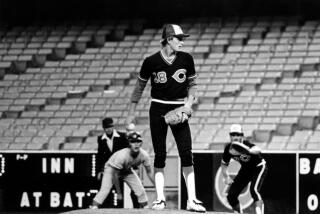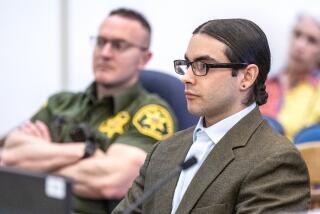Boy, 13, Gets 12 Years for Murder
A 13-year-old Palmdale Pony League pitcher convicted of murdering a 15-year-old with a baseball bat was sentenced Thursday to confinement at the California Youth Authority until the age of 25.
The boy, who was not identified because of his age, clubbed Jeremy Rourke in the head after the older boy, a friend of the family, teased him for losing a game.
The 13-year-old could be released at the discretion of youth prison authorities before his 12-year term is completed. The sentence, however, was the maximum available to Los Angeles County Superior Court Judge Richard Naranjo, who said his main concern was “protection of society.”
“This is not the case of negligence in driving a car. This is not a case of fighting between two people. This is a case where [the defendant] was angry, frustrated with losing a game and didn’t want to be teased,” Naranjo said. “Could this happen again?”
“Jeremy Rourke didn’t deserve to die for teasing,” the judge added.
The judge’s remarks capped off an emotional hearing inside Lancaster Juvenile Courthouse, where prosecutors and Jeremy’s family asked for the ultimate sentence while witnesses for the defendant pleaded for leniency.
“I felt the [killing] was very uncharacteristic of the minor,” said Clive Kennedy, a court-ordered psychologist who examined the boy and testified for the defense. He found the 13-year-old to be a good student and respectful of authority, though somewhat immature.
He said he didn’t believe the Youth Authority, which houses some of the state’s worst juvenile offenders, would be a good fit for the boy.
“The minors I tend to see in the California Youth Authority tend to have an anti-social personality style. They tend to be ... violent,” Kennedy said.
Several youth sports coaches also testified for the defendant.
“To me, he’s one of the best kids I know,” said Lance Pierson, whose son played baseball with the 13-year-old. “He was such a well-behaved kid.”
Defense attorney William McKinney argued the boy should be placed in a camp and then a treatment facility for a term that could end up totaling less than two years.
But Jeremy’s family asked the judge to remember the boy’s violent death.
“He was supposed to go to college, have a family and be a coach,” cried Jeremy’s mother, Angela Rourke. “It’s not OK for something like this to happen. It wasn’t an accident.”
Jeremy’s family expressed anger over the defense’s portrayal of him as a bully, likening it to putting the victim on trial.
“He’s been dragged through the mud and everything else this whole trial, and he’s not here to defend himself,” said Jeremy’s father, Brian Rourke.
“The maximum penalty is fair,” Rourke added. “At 25, Jeremy will still be dead.”
During a three-day trial in Naranjo’s courtroom earlier this month, witnesses testified that the 13-year-old grew angry when Jeremy, 15, teased him about losing to a team with no previous wins. The two youths had been standing in a snack bar line, surrounded by dozens of other children and parents after an evening game.
After the older youth shoved him, the younger boy pulled an aluminum bat out of an athletic bag, witnesses testified. The 13-year-old swung twice, first at Jeremy’s legs, then at his head.
On the witness stand, the 13-year-old said he never intended to kill Jeremy.
He reached for his bat, he said, because he felt scared of the older boy, who stood a head taller and weighed 100 pounds more than he did. A former Pony League coach also testified that Jeremy had a reputation for being a bully.
McKinney argued that because 13-year-old acted in self-defense, the killing was manslaughter, not murder.
Naranjo found the boy guilty of second-degree murder, however, agreeing with prosecutors that his conduct was malicious and that as a baseball player, he should have known the serious bodily injuries that could result by bludgeoning someone with a bat, even if he didn’t intend to kill.
Under state law, judges have wide discretion over how to sentence a juvenile convicted of a crime.
Though the California Youth Authority legally can parole the 13-year-old at any time, it is likely that he will remain detained for at least three or four years because of the severity of his crime, said Deputy Dist. Atty. Lonnie Felker. The prosecutor added that the youth authority would release a child only after he is deemed ready to reenter society.
After hearing news of the sentencing, some Palmdale residents said they thought the judge was too harsh on the boy.
“He killed one of my friends,” said Lester Guitierrez, a 10th-grader who met Jeremy when he was in the sixth grade. “But I still think it’s only manslaughter. He’s only 12? 13?”
But others thought the punishment was more than just.
“He killed a life. He’s 13. He should know better,” said Valerie Wilson, 42, a child nutritionist. “That should teach him a lesson. You don’t go around hitting people because they tease you.”
More to Read
Sign up for Essential California
The most important California stories and recommendations in your inbox every morning.
You may occasionally receive promotional content from the Los Angeles Times.










